| Srl | Item |
| 1 |
ID:
073205
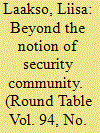

|
|
|
| 2 |
ID:
058986
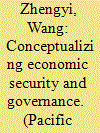

|
|
|
| 3 |
ID:
081028
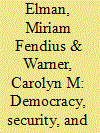

|
|
|
|
|
| Publication |
2008.
|
| Summary/Abstract |
This article analyzes the effects of democracy on religious political parties. Using a comparative and cross-regional approach, we argue that religious political parties in democracies can be "tamed" with access to patronage, power, and policy. While democracy tends to have a moderating influence, we identify the conditions and circumstances under which extremism may not be quelled merely by the party's participation in the government. The article briefly considers the arguments - both pro and con - that have emerged in recent debates over the intersection of religion, security, and democracy. The article then provides a framework for assessing the impact of democracy on religious political parties, and considers how these dynamics play out in the Asian region. In addressing the question "does democracy tame the radicals?" it is important to study Asia because it offers a set of varied democratic institutions; demonstrates different ways of adjudicating religion, the state, and secularism; and includes a diverse set of religious political parties espousing both moderate and radical political platforms. The article concludes with an overview of the Forum essays, which analyze democracy, security, and religious political parties in India, Indonesia, Italy and Israel.
|
|
|
|
|
|
|
|
|
|
|
|
|
|
|
|
| 4 |
ID:
058984
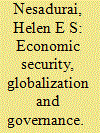

|
|
|
| 5 |
ID:
077177
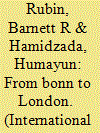

|
|
|
|
|
| Publication |
2007.
|
| Summary/Abstract |
Abstract Following the four-year Bonn Agreement implementation period, from December 2001 to December 2005, the London Conference on Afghanistan was convened, 31 January-1 February, to reaffirm the commitment of world leaders to the next phase of statebuilding and reform in Afghanistan. The central document of this gathering, the Afghanistan Compact, sets forth a number of time-bound benchmarks for the next five years in the areas of security, governance and development. This article examines key aspects of the compact and what will be required for the government of Afghanistan to meet the various targets, along with the support of the international community. Policy recommendations are further advanced to facilitate reconstruction efforts and to sustain a sufficient level of international engagement to avert failure in Afghanistan
|
|
|
|
|
|
|
|
|
|
|
|
|
|
|
|
| 6 |
ID:
052914
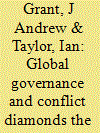

|
|
|
| 7 |
ID:
076183


|
|
|
|
|
| Publication |
2006.
|
| Summary/Abstract |
Zones of state failure are assumed to be anarchic. In reality, communities facing the absence of an effective state authority forge systems of governance to provide modest levels of security and rule of law. Nowhere is this phenomenon more evident than in Somalia, where an array of local and regional governance arrangements have emerged since the 1991 collapse of the state. The Somalia case can be used both to document the rise of governance without government in a zone of state collapse and to assess the changing interests of local actors seeking to survive and prosper in a context of state failure. The interests of key actors can and do shift over time as they accrue resources and investments; the shift "from warlord to landlord" gives some actors greater interests in governance and security, but not necessarily in state revival; risk aversion infuses decisionmaking in areas of state failure; and state-building initiatives generally fail to account for the existence of local governance arrangements. The possibilities and problems of the "mediated state model," in which weak states negotiate political access through existing local authorities, are considerable.
|
|
|
|
|
|
|
|
|
|
|
|
|
|
|
|
| 8 |
ID:
058988


|
|
|
| 9 |
ID:
061768
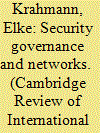

|
|
|
|
|
| Publication |
2005.
|
| Summary/Abstract |
The end of the Cold War has not only witnessed the rise of new transnational threats such as terrorism, crime, proliferation and civil war; it has also seen the growing role of non-state actors in the provision of security in Europe and North America. Two concepts in particular have been used to describe these transformations: security governance and networks. However, the differences and potential theoretical utility of these two concepts for the study of contemporary security have so far been under-examined. This article seeks to address this gap. It proposes that security governance can help to explain the transformation of Cold War security structures, whereas network analysis is particularly useful for understanding the relations and interactions between public and private actors in the making and implementation of national and international security policies.
|
|
|
|
|
|
|
|
|
|
|
|
|
|
|
|
| 10 |
ID:
080930


|
|
|
| 11 |
ID:
017528


|
|
|
|
|
| Publication |
2000.
|
| Description |
31-60
|
|
|
|
|
|
|
|
|
|
|
|
|
|
|
|